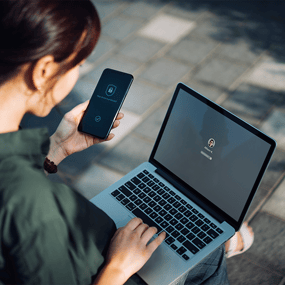Whether flying to California for a business conference or driving to Florida for a family vacation, security should be top-of-mind when traveling. It's important to remain vigilant to keep your business and personal information safe. Read about these 5 cybersecurity threats that business travelers and vacationers often encounter:
- Travel Sites
Data breaches targeting hotels, airlines, or travel-booking websites have increased since the pandemic. In fact, online fraud schemes targeting the travel and hospitality industries have increased 155% globally from 2021 to 2022 (Intel471). Cybercriminals can exploit such breaches to access your sensitive data like names, addresses, passport details, or credit card information. Although these travel sites are pretty unavoidable, it is good to be aware of this to look out for suspicious activity when using. - Business Centers or Airport Lounges
Hotels or lounges typically provide desktop computers so travelers and guests can do simple tasks like check emails or print boarding passes. While convenient, an attacker can plant malicious software on these computers or install physical hardware that records key strokes to steal information. Try to avoid, if possible, by using a personal device instead.
- Free Public Wi-Fi
altafiber has free public Wi-Fi, so we certainly aren't discouraging you from using public Wi-Fi altogether. With this being said, you should use extra caution when connecting to certain networks on the road, especially if you plan to access confidential information for or about your business. One safe route is to use VPN (virtual private network). VPNs encrypt data that is sent to and from your computer, which prevents attackers from capturing the data packets as you connect to the internet. If you don’t have a VPN, it’s best to avoid accessing sensitive data, like bank accounts or logging in to your work over free Wi-Fi.Remember that these rules apply to phones, as well. When you aren’t actively trying to connect to Wi-Fi, turn off the function to both save battery life and prevent your phone from trying to connect to networks automatically. This is a feature attackers can use to trick your device into connecting to their malicious network.
- Charging Stations
Areas where people congregate like airports, bus stations, and even restaurants or bars, often have “charging stations” that you can plug your phone in to charge. These areas are incredibly useful, but be careful of ones that have USB ports instead of standard power outlets. These can pose the risk of an attacker attaching a malicious device behind the outlet and using the USB charging port to connect to your device without your knowledge. We suggest purchasing a portable charger or power bank to charge your devices when out-and-about. - Rental Cars
This one may seem like a stretch in terms of a cybercrime, but rental cars can be dangerous if you connect your phone to them for music or directions. “Infotainment” systems in cars ask for access to information, like your contact list and files on your device, so they can look for saved audio files to play. You can decline this access during the sync process, but even basic information like your name, the type of device, and serial number gets saved so others can access that data. If you do sync your phone to the car’s Bluetooth system, just be sure to delete the device from the system memory before returning the car.
One more cybersecurity tip before traveling: Back up any important documents such as passports, visas, and IDs. Store them securely online with a unique password, or keep physical copies separate from the originals. This will be helpful in case your documents are lost or stolen.
We aren't expecting you to avoid these common travel areas completely, that would make traveling pretty hard! However, it's beneficial to be knowledgeable and cautious about the potential cyberthreats related to these areas.
*A portion of this data was written by our Hawaiian Telcom employee Jordan Silva, and can also be found in the Hawaiian Telcom Blog.

